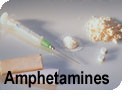LSD | Rohypnol | GHB | Ketamine | Steroids | Tobacco | Alcohol
Drug Information for AMPHETAMINES

Amphetamine (alpha-methyl-phenethylamine), also known as speed or crank, is a stimulant, and club drug, used to diminish the appetite, control weight, and treat disorders including narcolepsy and attention-deficit hyperactivity disorder. It is also used recreationally and for performance enhancement (these uses are illegal in some countries).
Medicinal use:
- Diet suppressant
- ADD
- ADHD
- Narcolepsy
- Treatment-resistant depression
Recreational use:
- Stimulant
Side effects:
- Dizziness
- Tachycardia
- Sweating
- Decrease in appetite/weight loss
- Euphoria followed by depression
- Insomnia
- Anger
- Aggressiveness
- Hostility
Along with methylphenidate (Ritalin, Concerta, etc.), amphetamine is one of the standard treatments for ADHD. Beneficial effects for ADHD can include improved impulse control, improved concentration, decreased sensory overstimulation, and decreased irritability. These effects can be dramatic, particularly in young children. The ADHD medication Adderall is composed of four different amphetamine salts, and Adderall XR is a timed release formulation of these same salt forms.
When used within the recommended doses, side-effects like loss of appetite tend to decrease over time. However, amphetamines last longer in the body than methylphenidate (Ritalin, Concerta, etc.), and tend to have stronger side-effects on appetite and sleep.
Amphetamines are also a standard treatment for narcolepsy as well as other sleeping disorders. They are generally effective over long periods of time without producing addiction or physical dependence.
Amphetamines are sometimes used to augment anti-depressant therapy in treatment-resistant depression.
Medical use for weight loss is still approved in some countries, but is regarded as obsolete and dangerous in, for example, the United States.





